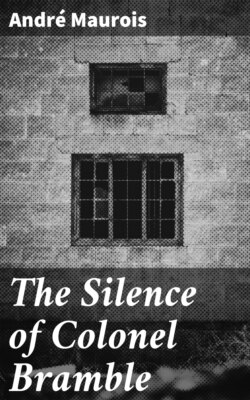Читать книгу The Silence of Colonel Bramble - Andre Maurois - Страница 4
На сайте Литреса книга снята с продажи.
CHAPTER II
ОглавлениеTable of Contents
"Clear the table," said Colonel Bramble to the orderlies. "Bring the rum, a lemon, some sugar and hot water, and keep some more boiling. Then tell my batman to give me the gramophone and the box of records."
This gramophone, a gift to the Highlanders from a very patriotic old lady, was the colonel's pride. He had it carried about after him everywhere and treated it with delicate care, feeding it every month with fresh records.
"Messiou," he said to Aurelle, "what would you like? 'The Bing Boys,' 'Destiny Waltz,' or 'Caruso.'"
Major Parker and Dr. O'Grady solemnly consigned Edison and all his works to a hotter place; the padre raised his eyes to heaven.
"Anything you like, sir," said Aurelle, "except 'Caruso.'"
"Why?" said the colonel. "It's a very good record, it cost twenty-two shillings. But first of all you must hear my dear Mrs. Finzi-Magrini in 'La Tosca.' Doctor, please regulate it, I can't see very well—Speed 61. Don't scratch the record, for God's sake!"
He sank down on his biscuit boxes, arranged his back comfortably against a heap of sacks, and shut his eyes. His rugged face relaxed. The padre and the doctor were playing chess, and Major Parker was filling in long returns for brigade headquarters. Over a little wood, torn to bits by shells, an aeroplane was sailing home among fleecy white clouds in a lovely pale-green sky. Aurelle began a letter.
"Padre," said the doctor, "if you are going to the division to-morrow, ask them to send me some blankets for our dead Boches. You saw the one we buried this morning? The rats had half eaten him. It's indecent. Check to the king."
"Yes," said the padre, "and it's curious how they always begin at the nose!"
Over their heads a heavy English battery began to bombard the German line. The padre smiled broadly.
"There'll be dirty work at the cross roads to-night," he remarked with satisfaction.
"Padre," said the doctor, "are you not the minister of a religion of peace and love?"
"The Master said, my boy, that one must love one's fellow-man. He never said that we must love Germans. I take your knight."
The Reverend John MacIvor, an old military chaplain, with a face bronzed by Eastern suns, took to this life of war and horrors with the enthusiasm of a child. When the men were in the trenches he visited them every morning with his pockets bulging with hymn-books and packets of cigarettes. While resting behind the lines, he tried his hand at bombing and deplored the fact that his cloth forbade him human targets.
Major Parker suddenly stopped his work to curse Brass Hats and their absurd questions.
"When I was in the Himalayas at Chitral," he said, "some red-hats sent us a ridiculous scheme for manoeuvres; among other details the artillery had to cross a rocky defile hardly wide enough for a very thin man.
"I wired, 'Scheme received; send immediately a hundred barrels of vinegar.' 'Report yourself to the P.M.O. for mental examination,' courteously remarked headquarters. 'Re-read "Hannibal's Campaign,"' I replied."
"You really sent that telegram?" asked Aurelle. "In the French army you would have been court-martialled."
"That's because our two nations have not the same idea of liberty," said the major. "To us the inalienable rights of man are humour, sport, and primogeniture."
"At the headquarters of the brigade," said the padre, "there is a captain who must have had lessons from you in military correspondence. The other day, as I had no news of one of my young chaplains who had left us about a month, I sent a note to the brigade: 'The Reverend C. Carlisle was invalided on September 12th. I should like to know if he is better, and if he has been given a new appointment.' The reply from the hospital said simply: '1. Condition unchanged. 2. Ultimate destination unknown.' The officer in transmitting it to me had added, 'It is not clear whether the last paragraph refers to the unit to which the Rev. C. Carlisle will be eventually attached, or to his eternal welfare.'"
The Italian air came to an end with a triumphant roulade.
"What a voice!" said the colonel, opening his eyes regretfully.
He carefully stopped the record and put it affectionately in its case.
"Now, messiou, I am going to play 'Destiny Waltz.'"
One could just see outside the Verey lights gently rising and falling. The padre and the doctor went on describing their corpses while carefully manoeuvring the ivory pieces of the little set of chessmen; the howitzers and machine-guns broke into the voluptuous rhythm of the waltz, creating a sort of fantastic symphony highly appreciated by Aurelle. He continued to write his letter in easy verses.
"La Mort passe; le Destin chante;
Vite, oublie-moi.
Tes robes noires sont charmantes;
Mets-les six mois.
Garde-toi de venir en pleurs
M'offrir des roses;
Aux vivants réserve tes fleurs
Et toutes choses.
Il ne faut pas m'en vouloir, mon amie, si je tourne an plus plat des romantismes: un clergyman et un médecin, à côte de moi, s'obstinent à jouer les fossoyeurs d'Hamlet.
Ne me plains pas, je dormirai
Sans barcaroles,
Et de mon corps je nourrirai
Des herbes folles.
Mais si, par quelque soir d'automne
On de brouillard,
Pour ton visage de madone
Tu veux le fard.
De cet air de mélancolie
Que j'aimais tant,
Alors oublie que tu m'oublies
Pour un instant."
"Do you like my waltz, messiou?" said the colonel.
"Very much indeed, sir," said Aurelle sincerely.
The colonel gave him a grateful smile.
"I'll play it again for you, messiou. Doctor, regulate the gramophone slower, speed 59. Don't scratch the record. For you, this time, messiou."
